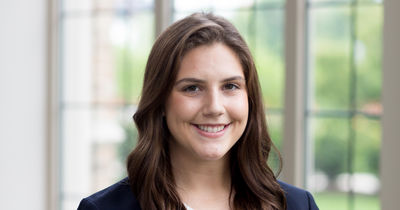
When Katie Beriont graduated in 2018, she knew there was a whole other dimension of her science-business degree she’d yet to explore. Luckily during her senior year at Notre Dame, she discovered that there were a growing number of opportunities to do it on the same campus she was already on.
It was through her involvement in pancreatic cancer research at the Harper Cancer Research Institute (HCRI), across from Notre Dame’s campus, that she became curious about the path therapeutic discoveries take to reach patients. While Katie enjoyed research and the brilliant minds it allowed her to work with, she felt called to something else which extended outside of the lab. “I wasn’t the best fit for bench work, but I liked considering how inventions like that are translated into clinical applications.” Like any good Notre Dame student does, Katie went on to become a double Domer and pursued a Master’s in Engineering, Science and Technology Entrepreneurship with the ESTEEM program. Not long after her graduation and before starting ESTEEM, Katie, who had heard about a summer job opportunity at the IDEA Center, began work as a technical analyst. The position entailed dissecting newly developed and emerging technologies, delineating their risk and potential, and understanding how best to build them into a business. This work tapped in to the same inspiration that fueled her efforts in the laboratory: creating new solutions to problems that demand them. Rather than investigating possible solutions in science at HCRI, she was investigating the potential science has to reach the market at the IDEA Center.
Currently, Katie works as a Technology Licensing Associate at the Massachusetts Institute of Technology (MIT) where she continues to build upon the skills she developed throughout her Notre Dame education while simultaneously branching out into different facets of innovation and entrepreneurship. Working within licensing, Katie is exposed to the back-end process of preparing an academic technology for ownership by a start-up or industry and then taking part in drafting the license agreements that releases the technology for product development. While her IDEA Center analyst position was focused more on the front-end of product commercialization, Katie insists, “it still helps to be able to think about the value of an invention’s IP in terms of understanding the market, barriers to entry, and other questions that you should ask yourself intuitively.” As she explores different dimensions of commercialization to both diversify and hone her technical expertise, Katie continues to lean on these fundamental principles of entrepreneurship. “You always need that framework of thinking, no matter what stage [of the process] you’re at.”